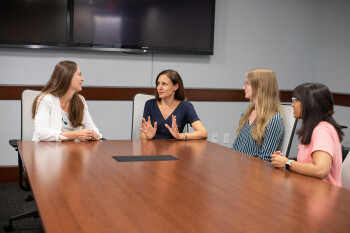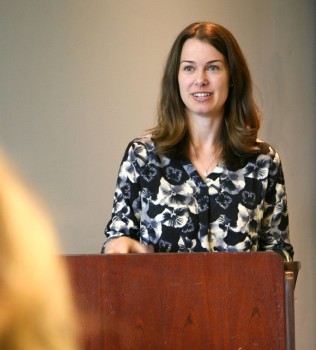
Jackie Nelson
Research Interests: Studies emotions in family relationships, particularly parent-child interaction, family stress and conflict, and child social-emotional development
972-883-4478
JO 4.202
Family Research Lab
Curriculum Vitae
Currently accepting undergraduate students
Professional Preparation
University of North Carolina at Greensboro - 2011
University of North Carolina at Greensboro - 2008
Elon University - 2006
Research Areas
Research Interests
Family members live in a system where they are constantly influenced by one another and by the environment. Emotion is a large part of family life and is especially likely to be transferred between parents and children. I am interested in many family processes including how mothers and fathers influence their spouse's parenting behavior, how stress occurring in parents' multiple roles affects family interaction, and how parents interact with their children and socialize their children's emotional development.
Publications
Additional Information
PERSONAL STATEMENT
Jackie Nelson earned her bachelor's degree in Psychology at Elon University and her doctoral degree in Human Development and Family Studies at the University of North Carolina at Greensboro. She is an Associate Professor of Psychology studying parenting, family interaction, family stress, and children's social-emotional development. Dr. Nelson directs the Family Research Laboratory and the Psychology Master's program.News Articles
Researchers Examine How To Make Young Kids’ Mealtimes Go Smoothly
 Two researchers from The University of Texas at Dallas’ School of Behavioral and Brain Sciences (BBS) have published the results of two recent studies in the journal Appetite that analyze perceptions and variability of feeding preschool-age children while co-parenting.
Two researchers from The University of Texas at Dallas’ School of Behavioral and Brain Sciences (BBS) have published the results of two recent studies in the journal Appetite that analyze perceptions and variability of feeding preschool-age children while co-parenting.Dr. Shayla Holub, psychology department chair, and Dr. Jackie Nelson, associate professor of psychology, are co-authors of both papers. Their findings emphasize the importance of parents collaborating on a unified mealtime strategy, both to help the child develop self-regulation skills — eating the right amount, not too little or too much — and to foster marital harmony.
New BBS Researcher Focused on Family Dynamics
 Dr. Jackie Nelson, a new assistant professor in the UT Dallas School of Behavioral and Brain Sciences (BBS), is interested in parents and children, and the ways family relationships contribute to emotional development. Nelson joined UT Dallas this fall, and the psychologist is primarily teaching classes centered on child development and parental interactions. She said she is enjoying getting to know her new students and faculty colleagues.“My early impression of UT Dallas students is that they are very intelligent, curious and enthusiastic, with a diverse range of backgrounds and experiences,” she said. After graduating with a Bachelor of Arts degree in psychology from Elon University, Nelson earned her Master of Science and PhD degrees in human development and family studies at the University of North Carolina at Greensboro. She is looking forward to collaborating on a variety of projects with her new colleagues in BBS
Dr. Jackie Nelson, a new assistant professor in the UT Dallas School of Behavioral and Brain Sciences (BBS), is interested in parents and children, and the ways family relationships contribute to emotional development. Nelson joined UT Dallas this fall, and the psychologist is primarily teaching classes centered on child development and parental interactions. She said she is enjoying getting to know her new students and faculty colleagues.“My early impression of UT Dallas students is that they are very intelligent, curious and enthusiastic, with a diverse range of backgrounds and experiences,” she said. After graduating with a Bachelor of Arts degree in psychology from Elon University, Nelson earned her Master of Science and PhD degrees in human development and family studies at the University of North Carolina at Greensboro. She is looking forward to collaborating on a variety of projects with her new colleagues in BBS
Jackie Nelson Receives BBS Teaching Award
 Assistant professor Dr. Jackie Nelson wants her classes to be supportive, but also challenging. Based on reviews from students and fellow faculty members, she apparently has been successful. Nelson recently was awarded the 2016 Aage Møller Teaching Award, one of several honors given to faculty members and students in the School of Behavioral and Brain Sciences (BBS).
Assistant professor Dr. Jackie Nelson wants her classes to be supportive, but also challenging. Based on reviews from students and fellow faculty members, she apparently has been successful. Nelson recently was awarded the 2016 Aage Møller Teaching Award, one of several honors given to faculty members and students in the School of Behavioral and Brain Sciences (BBS).Nelson teaches undergraduate and graduate classes on child development and family psychology. Her research examines children’s social-emotional development and how mothers’ and fathers’ experiences at work, home, and in relationships are related to interactions with their children.
Avoiding Blame Game Is the Smart Strategy in Parent-Child Conflicts
A UT Dallas researcher says there’s a smart way for children and parents to disagree — and it doesn’t involve casting blame.Dr. Jackie Nelson, assistant professor in the School of Behavioral and Brain Sciences, said parents and children who focused discussions on future-oriented planning, rather than accusations and culpability, were more likely to reach a compromise in which both parents’ and children’s goals are realized. In addition, her research showed that how conflicts are resolved can predict changes in children’s externalizing problems a year later.